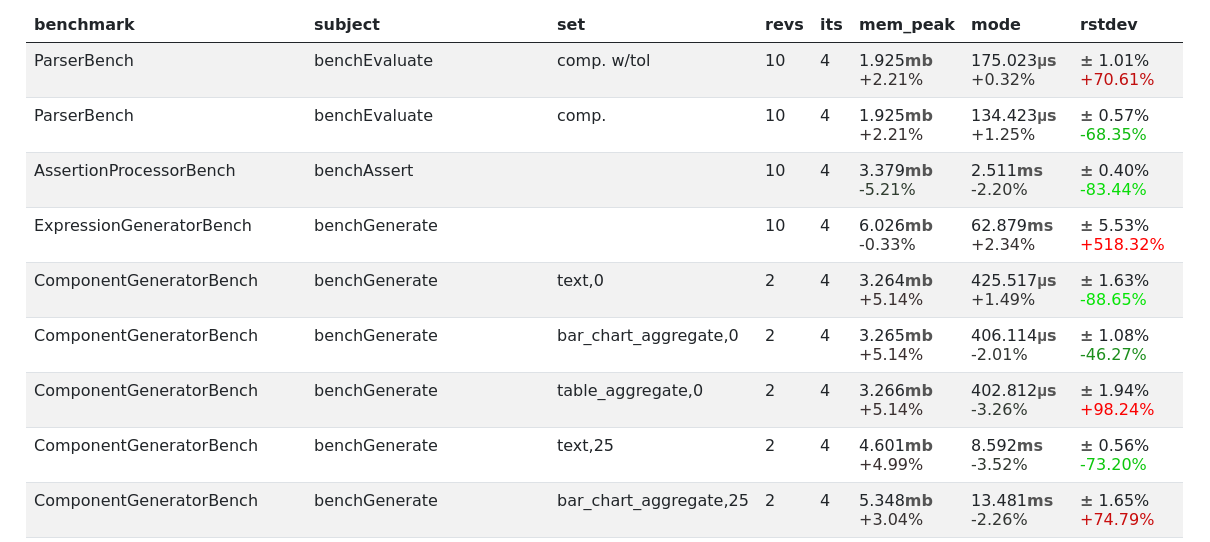Table Aggregate¶
Render a table with aggregated data.

HTML output
Options¶
- title:
Type(s):
[string, null], Default:NULLCaption for the table
- partition:
Type(s):
[string, string[]], Default:[]Partition the data using these column names - the row expressions will to aggregate the data in each partition
- row:
Type(s):
array, Default:[]Set of expressions used to evaluate the partitions, the key is the column name, the value is the expression
- groups:
Type(s):
array, Default:[]Group columns together, e.g.
{"groups":{"group_name": {"cols": ["col1", "col2"]}}}
Example¶
Given the following configuration:
{
"runner.path": "NothingBench.php",
"runner.executor": "debug",
"runner.env_enabled_providers": ["test"],
"report.generators": {
"nested": {
"generator": "component",
"title": "My Aggregated Table",
"components": [
{
"component": "table_aggregate",
"title": "Table",
"row": {
"benchmark": "first(partition['benchmark_name'])",
"net_time": "sum(partition['result_time_net'])"
}
}
]
}
}
}
When we run PHPBench with the configured report above:
phpbench run --report=nested
Then it generates the following with the console renderer:
My Aggregated Table
===================
Table
+--------------+----------+
| benchmark | net_time |
+--------------+----------+
| NothingBench | 10 |
+--------------+----------+
Advanced Columns¶
More advanced behavior can be accessed by passing an object instead
of an expression, specifying a “column processor” type.
expand¶
You can “expand” columns dynamically by further partitioning the data frame
with the expand column processor:
{
"runner.path": "MultipleSubjects.php",
"runner.executor": "debug-example",
"runner.iterations": 5,
"runner.executors": {
"debug-example": {
"executor": "debug",
"times":[10, 20, 30, 40, 50],
"spread": [4, 5, 2, 3]
}
},
"runner.env_enabled_providers": ["test"],
"report.generators": {
"expanded": {
"generator": "component",
"components": [
{
"component": "table_aggregate",
"title": "Table with rows per iteration",
"partition": "subject_name",
"row": {
"benchmark": "first(partition['subject_name'])",
"by_iteration": {
"type": "expand",
"partition": ["iteration_index"],
"cols": {
"Iteration #{{ key }}": "mode(partition['result_time_avg'])"
}
}
}
}
]
}
}
}
Above we:
- Use an object as the value of the column definition
by_iteration(the name is arbitrary and subsequently not used, it needs only to be unique) - Specified the
typeto beexpand - We group (partition) the data by
iteration_index) - Specify a set of columns
Which would produce:
Table with rows per iteration
+---------------+--------------+--------------+--------------+--------------+--------------+
| benchmark | Iteration #0 | Iteration #1 | Iteration #2 | Iteration #3 | Iteration #4 |
+---------------+--------------+--------------+--------------+--------------+--------------+
| benchSubject1 | 14 | 25 | 32 | 43 | 54 |
| benchSubject2 | 14 | 25 | 32 | 43 | 54 |
| benchSubject3 | 14 | 25 | 32 | 43 | 54 |
+---------------+--------------+--------------+--------------+--------------+--------------+
Note that:
- The
partitionparameter is used by default, overwriting the partition from the parent scope. You can rename this using thevaroption. - The
keyvariable is made available representing the “key” of the partition, you can rename this variable with thekey_varoption.
